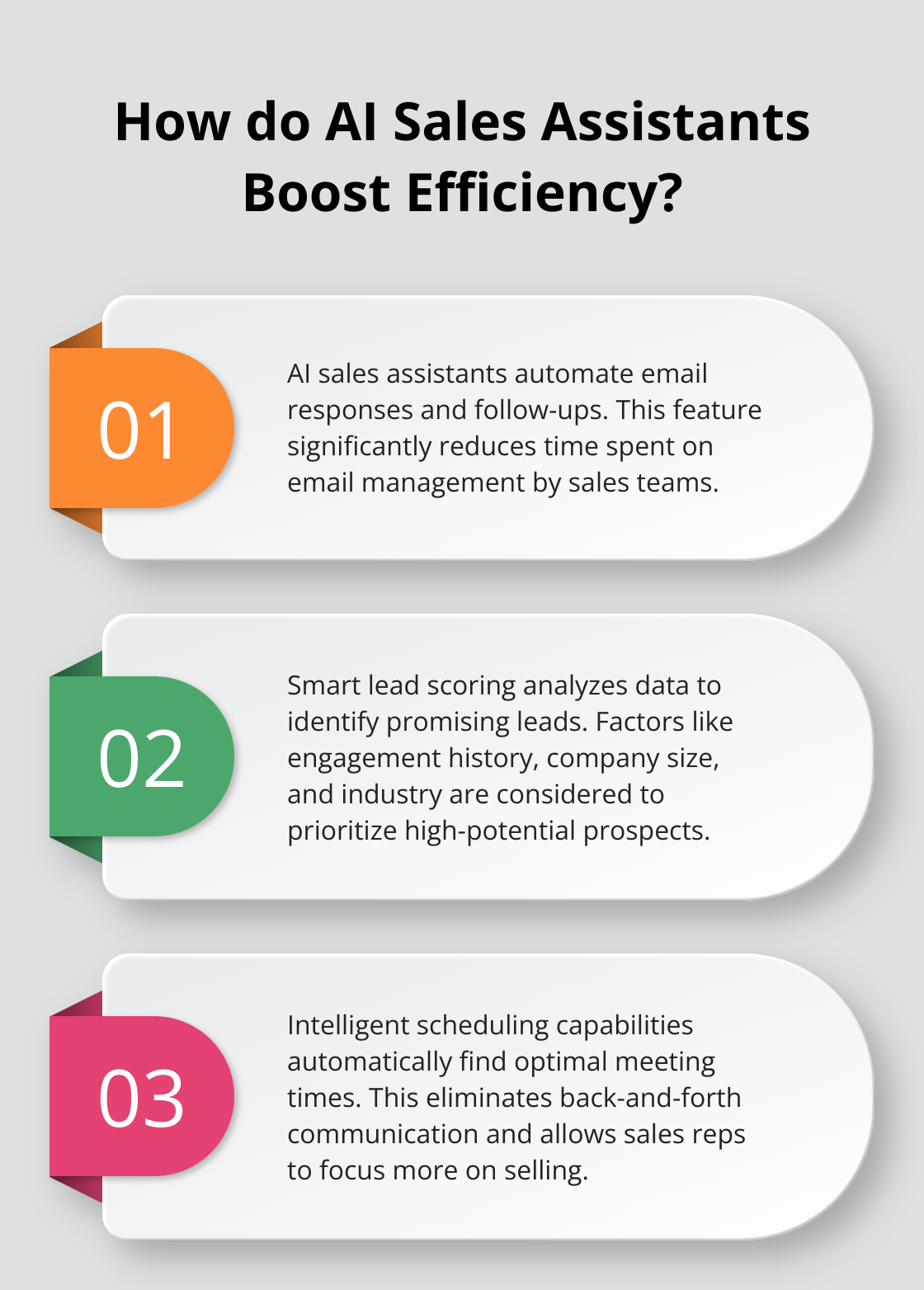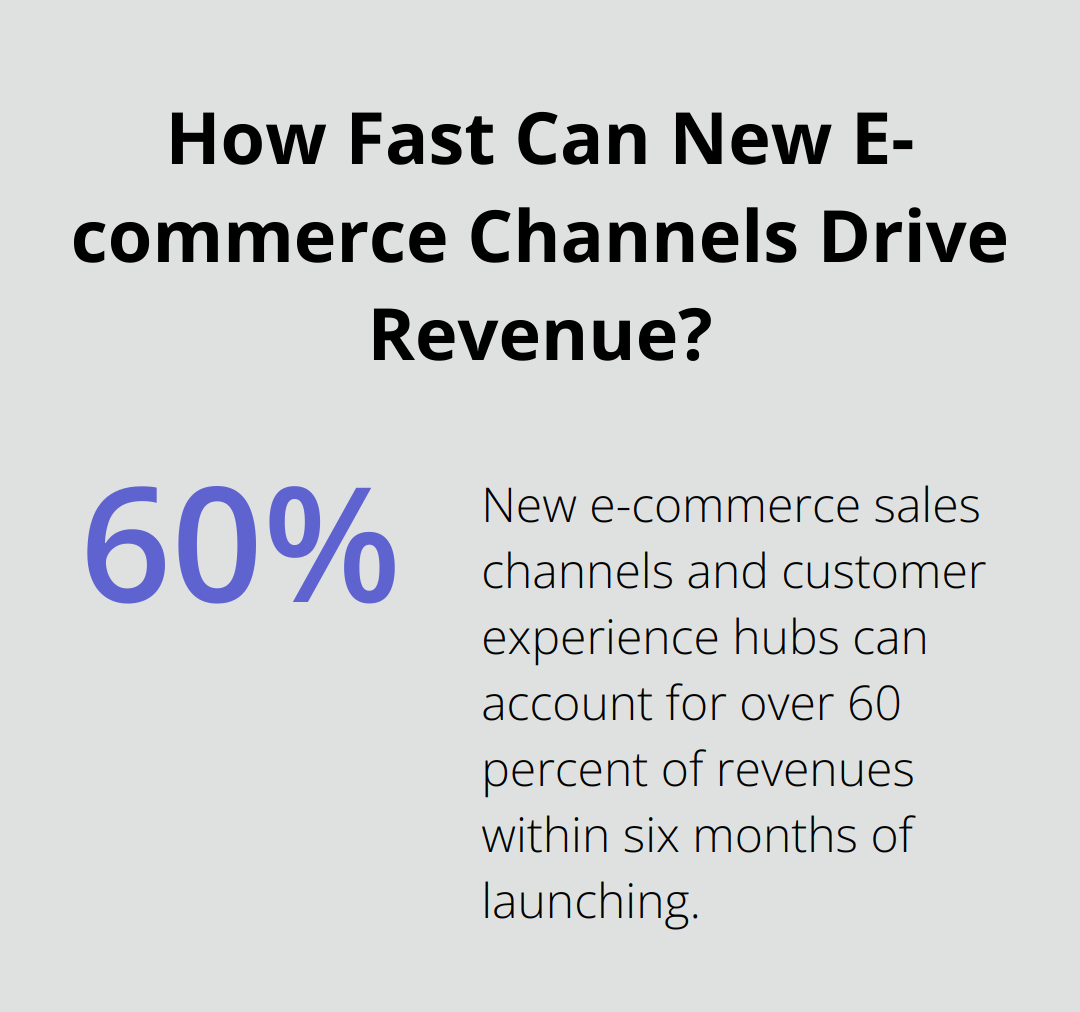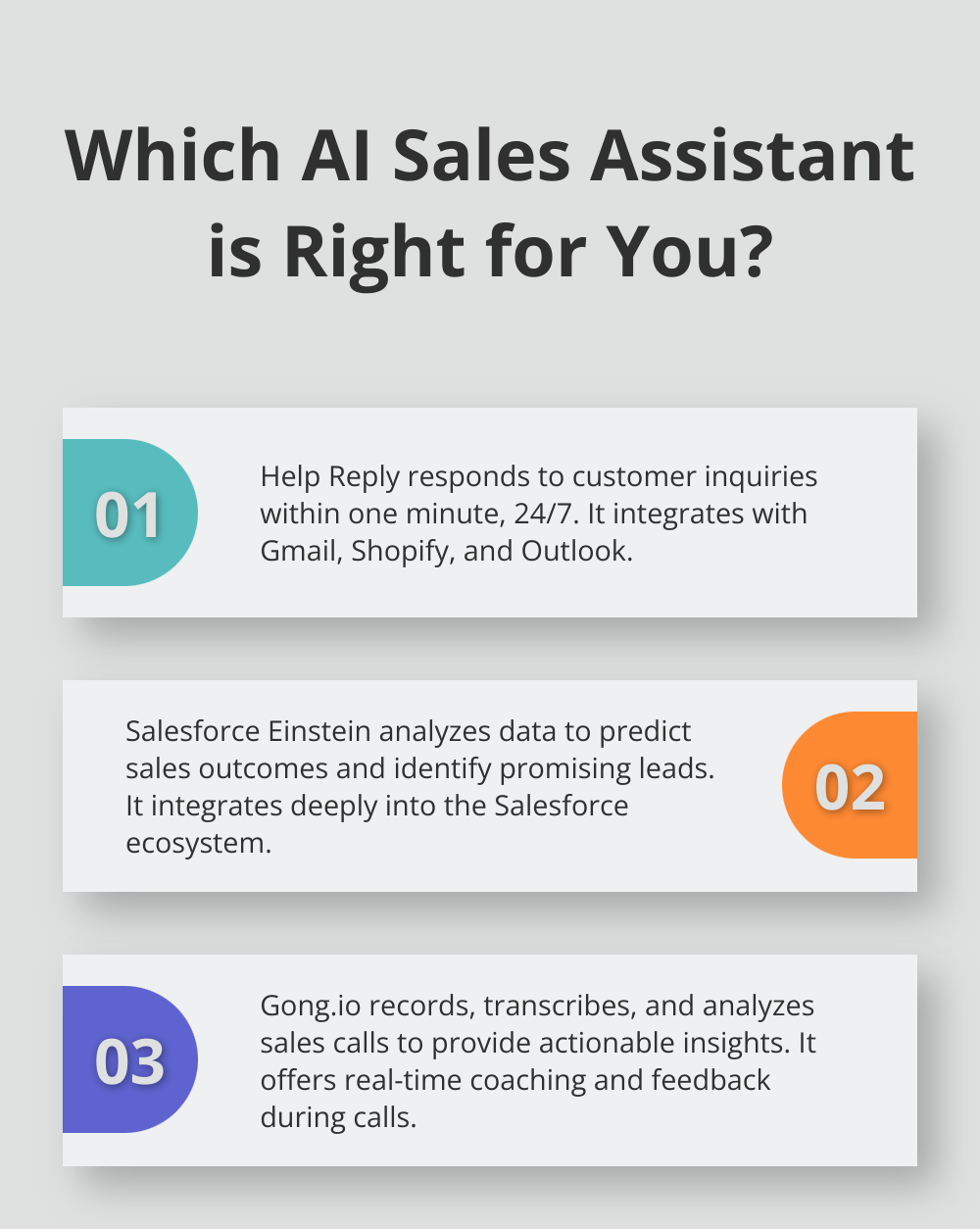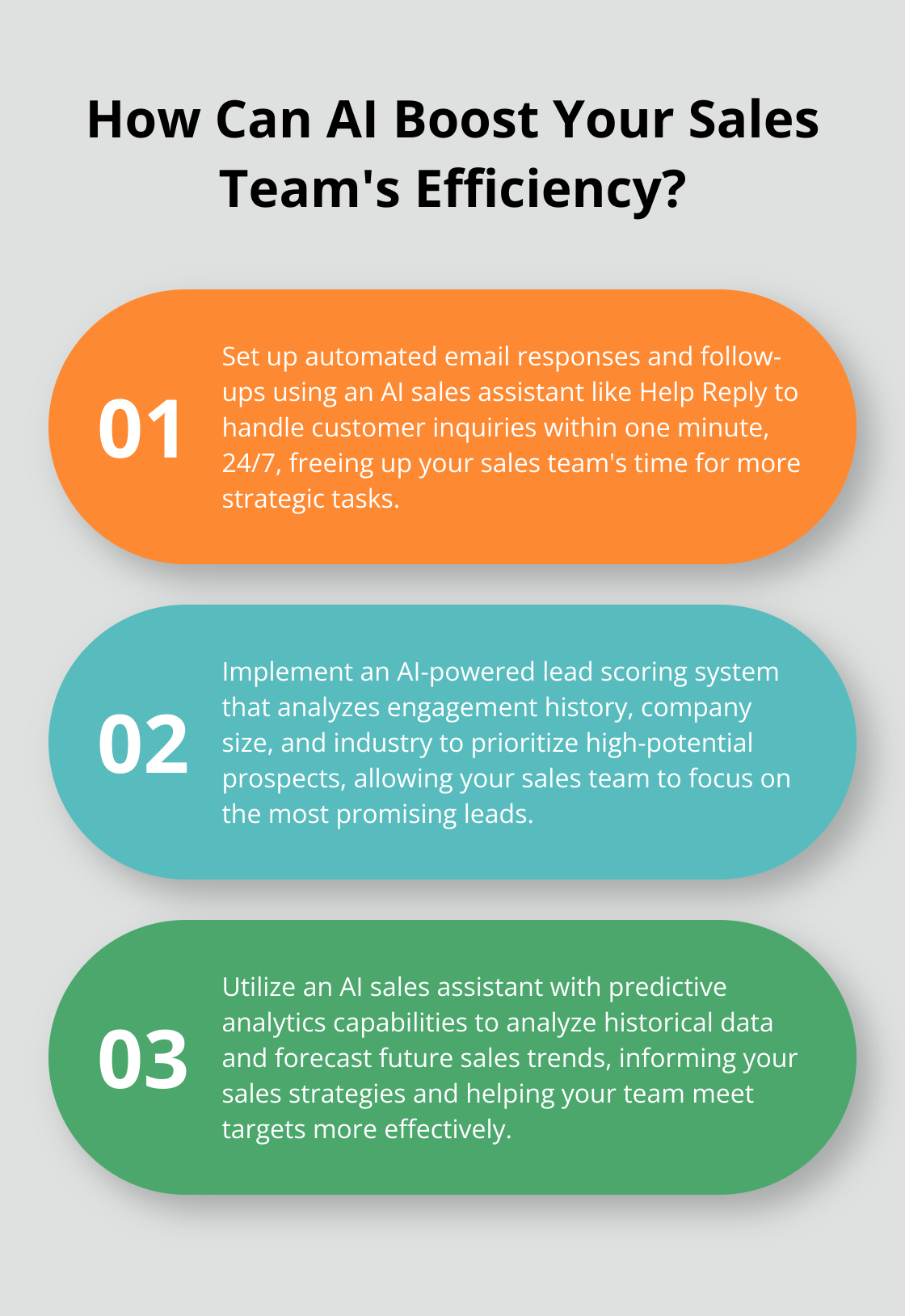AI sales assistants are revolutionizing the way businesses handle customer interactions and sales processes. These powerful tools can automate tasks, provide valuable insights, and significantly boost productivity.
At Help Reply, we understand the challenge of selecting the best AI sales assistant software for your unique needs. This guide will walk you through the key features to look for and how to evaluate different platforms, helping you make an informed decision.
What Are the Must-Have Features in AI Sales Assistant Software?
AI sales assistant software has transformed how businesses manage customer interactions and sales processes. Several key features can significantly enhance your AI sales assistant experience.
Automated Email Handling
Email management consumes a substantial portion of sales teams’ time. Top-tier AI sales assistants excel at automating email responses and follow-ups. Pipedrive’s Sales Assistant is an intelligent system that sends you notifications, insights and advice to help streamline your sales process and win more deals.
Smart Lead Management
Effective lead scoring and prioritization are essential for sales success. AI-powered tools analyze vast amounts of data to identify the most promising leads. They consider factors such as engagement history, company size, and industry to assign scores to leads. This allows sales teams to focus their efforts on high-potential prospects, which increases efficiency and conversion rates.
Intelligent Scheduling
AI sales assistants with smart scheduling capabilities save time. These tools automatically find the best meeting times based on everyone’s availability, send out invitations, and handle rescheduling. This eliminates the back-and-forth often associated with setting up meetings, allowing sales reps to spend more time on actual selling.
Predictive Analytics
Sales forecasting and analytics are vital for strategic decision-making. Advanced AI sales assistants use machine learning algorithms to analyze historical data and predict future sales trends. They can identify patterns that humans might miss, providing valuable insights that can inform sales strategies and help teams meet their targets.

When selecting an AI sales assistant, look for a solution that offers a combination of these features. While some platforms may excel in one area, the best tools provide a comprehensive suite of capabilities. For example, Help Reply not only offers rapid email response but also integrates seamlessly with popular tools like Gmail, Shopify, and Outlook, making it a versatile choice for businesses of all sizes.
The right AI sales assistant should not only automate tasks but also provide actionable insights that can drive your sales strategy forward. A careful evaluation of these features will help you select a tool that will transform your sales process and give your team a competitive edge in today’s fast-paced business environment.
Now that we’ve covered the essential features of AI sales assistant software, let’s explore how to evaluate different platforms to find the best fit for your business needs.
How to Evaluate AI Sales Assistant Platforms
Integration with CRM Systems
The effectiveness of an AI sales assistant depends on its ability to integrate with your existing Customer Relationship Management (CRM) system. When you evaluate platforms, check if they offer native integrations with popular CRMs like Salesforce, HubSpot, or Pipedrive.
User-Friendly Interface
The success of any new software implementation depends on user adoption. A complex or unintuitive interface can lead to resistance from your sales team and underutilization of the tool. Look for platforms that offer clean, straightforward dashboards and easy-to-navigate menus. Request demos or free trials to get hands-on experience with the interface. Pay attention to how quickly you can perform common tasks (like setting up automated responses or accessing analytics reports).
Customization Capabilities
Every business has unique sales processes and requirements. The best AI sales assistants offer robust customization options to align with your specific needs. This includes the ability to create custom workflows, tailor automated responses to match your brand voice, and configure lead scoring models based on your criteria. A report by McKinsey indicates that new e-commerce sales channels and customer experience hubs can account for over 60 percent of revenues within six months of launching.
Scalability and Pricing
As your business grows, your AI sales assistant should grow with you. Evaluate the scalability of each platform by considering factors such as user limits, storage capacity, and API call limits. Additionally, examine the pricing models carefully. Some providers offer tiered pricing based on features or user count, while others may charge based on usage metrics (like the number of leads processed or emails sent). Be cautious of platforms that require long-term contracts or have hidden fees for essential features.

When you assess scalability, also consider the platform’s ability to handle increasing data volumes and complexity. A robust AI sales assistant should maintain its performance and accuracy as your customer base and interaction history grow. This scalability is essential for maintaining consistent sales support as your business expands.
In terms of pricing, it’s important to calculate the total cost of ownership, including any necessary training or onboarding expenses. While a more expensive solution might seem daunting initially, it could provide better long-term value if it offers superior features and scalability. Conversely, a cheaper option might end up costing more in the long run if it requires frequent upgrades or doesn’t meet your growing needs.
Now that you understand how to evaluate AI sales assistant platforms, let’s explore some of the top options available in the market today.
Which AI Sales Assistants Lead the Pack?
The AI sales assistant market offers several standout platforms with innovative features and robust capabilities. This chapter explores some of the top contenders and highlights their unique strengths.
Help Reply: The Speed Champion
Help Reply excels in the AI sales assistant market with its rapid email response times. This platform handles customer inquiries within one minute, 24/7. Its quick response capability improves customer satisfaction and accelerates deal closures. Help Reply integrates seamlessly with popular tools like Gmail, Shopify, and Outlook, making it versatile for businesses of all sizes. The platform’s easy setup and continuous AI training ensure adaptation to evolving business needs.
Salesforce Einstein: The Analytics Powerhouse
Salesforce Einstein brings advanced analytics and predictive insights to the table. This AI-powered platform integrates deeply into the Salesforce ecosystem, making it an excellent choice for businesses already using Salesforce CRM. Einstein analyzes vast amounts of data to predict sales outcomes, identify promising leads, and suggest next best actions for sales reps.
Gong.io: The Conversation Analyzer
Gong.io specializes in conversation intelligence and deal insights. This platform records, transcribes, and analyzes sales calls to provide actionable insights. It uses AI to identify patterns in successful sales conversations, helping teams replicate winning strategies. The platform’s real-time coaching and feedback during calls prove particularly valuable for sales teams aiming to improve their performance continuously.
Drift: The Engagement Expert
Drift focuses on conversational marketing and sales, using AI-powered chatbots to engage website visitors and qualify leads. This platform creates personalized experiences for potential customers, guiding them through the sales funnel with targeted messaging. Drift’s ability to book meetings directly through chat conversations reduces the time sales reps spend on scheduling.
Choosing the Right AI Sales Assistant
When selecting an AI sales assistant, consider your specific business needs and existing tech stack. While Help Reply offers unparalleled speed in email responses, Salesforce Einstein might suit businesses heavily invested in the Salesforce ecosystem. Gong.io could be ideal if improving sales conversations is your primary goal, while Drift might enhance your website’s lead generation capabilities.

The best AI sales assistant for your business will depend on your unique requirements, budget, and growth plans. Take the time to thoroughly evaluate each option (perhaps through free trials or demos) before making a decision.
Final Thoughts
Selecting the best AI sales assistant software requires careful consideration of key features and evaluation criteria. The right solution will streamline your sales processes, improve efficiency, and drive growth for your business. Help Reply offers rapid email responses and seamless integration with popular tools, making it a strong contender in the AI sales assistant market.

Your chosen AI sales assistant should align with your specific business goals and challenges. It must enhance your team’s capabilities, improve customer satisfaction, and ultimately boost sales growth. Take advantage of free trials or demos to gain hands-on experience with different platforms before making your decision.
The implementation of an AI sales assistant can transform your business operations. It offers improved efficiency, better customer engagement, and valuable insights that can give your sales team a competitive edge. Choose a solution that fits your needs to set your sales team up for success in today’s fast-paced business landscape.


Leave a Reply